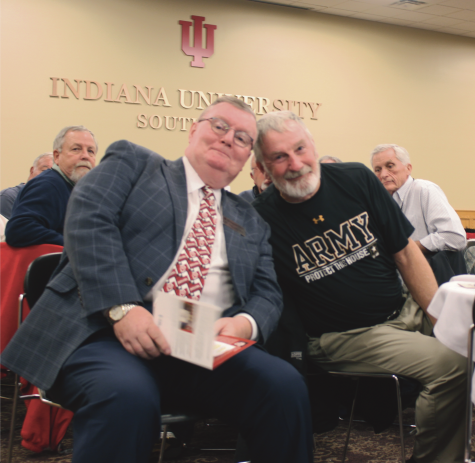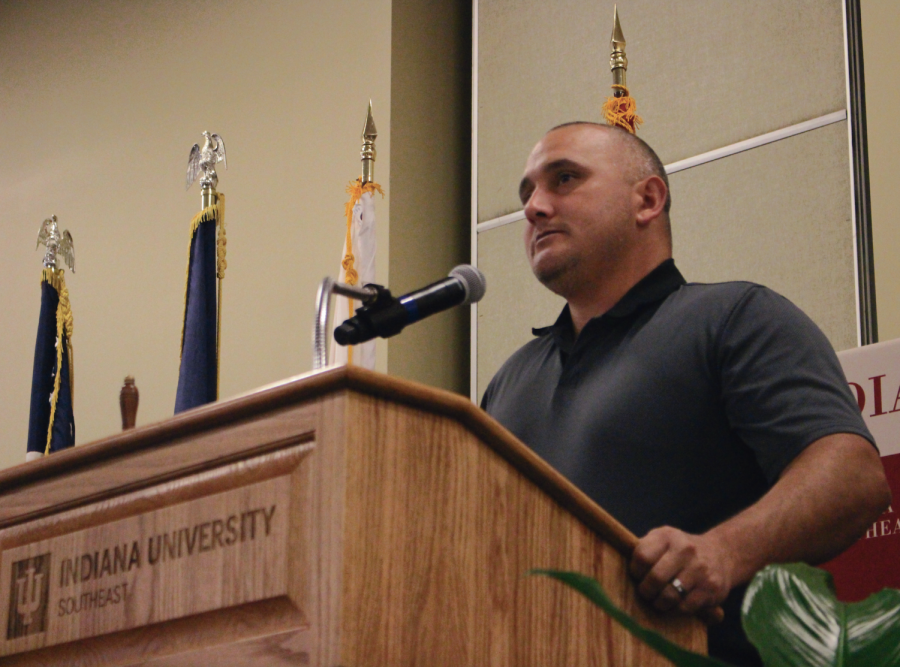From Active Duty to a Bachelor’s Degree
Recognizing veteran students and the challenges they face
Bryan Henderson, IUS student veteran organization president and senior psychology major, spoke during the Veterans Luncheon on Nov. 9.
November 15, 2018
Despite what you may see in a large number of coming-of-age college movies, not all college students begin their studies straight out of high school. Some, at IU Southeast and across the United States, may begin their studies straight out of Iraq or Afghanistan.
Veteran students fall into the category of “nontraditional” students, according to the National Center for Education Statistics. Nontraditional students are defined by IU Southeast as students over 24, international students, single parents and veterans.
By this definition, there are currently 1,138 nontraditional students enrolled at IU Southeast, according to fall 2018 campus census. This represents 24.9 percent of the student population. The census data also showed 10.6 percent of incoming students qualify as nontraditional.
While a lot of factors can qualify a student as nontraditional, one group within the nontraditional category is tasked with a myriad of challenges: veteran students. Returning from a tour of duty and transitioning from combat to powerpoints is no small feat.
Bryan Henderson, psychology senior, is a veteran. He is also the president of the Student Veterans Organization on campus. This is Henderson’s first year at IU Southeast.
Henderson, 37, served in the military for 13 years until he was medically retired. He began serving in the Navy then made the switch to the Army where he retired. Henderson’s home life can be hectic at times, as he and his wife Stephanie have seven children together.
Veteran Struggles
On top of home life and school work, Henderson deals with post-traumatic stress disorder and memory loss on a daily basis. He said Stephanie is great at reminding him about his medications and appointments.
“The hardest part of the PTSD is keeping my anxiety under control, but with the help of my wife and medications I think I manage it well enough,” he said.
Henderson said getting used to the school setting can be a challenge at times for Henderson. He hasn’t been in a school setting since high school, which was about 20 years ago. Just like every other student, Henderson struggles with keeping up with assignments and staying on top of his classes, along with remembering everything he has learned.
“I deal with feeling out of place at times because of the age difference of my classmates on campus, but I am sure that is just my anxiety talking,” Henderson said. “I also have issues walking, so I am in the wheelchair for the betterment of the day while I am on campus, which makes traveling from classroom to classroom or building to building a bit more difficult since my chair is ‘me’ powered.”
Tools on Campus
Kimberly D Pelle is the coordinator for nontraditional student programs at IUS. She also coordinates the family parent programs and runs the Adult Student Center on the second floor of the University Center. Pelle has been working at IU Southeast for 23 years and said she wears many different hats on campus.
Pelle has dealt with many different types of students ranging from single parents, veterans and senior citizens coming to school to get their degree. The Adult Student Center is a place where students can go to work on schoolwork in a safe and friendly environment where there are other students that are going through the same situations as them.
“The most prevalent issue is the balance between home, family, jobs, classes and schoolwork all at once. Usually when something falls through the cracks it’s school,” Pelle said.

Pelle touched on what nontraditional students deal with as well as what their mindset is when first coming back to school. Pelle said they question if they’ll succeed and if this is the right choice for them, and she is there for any kind of support and direction that they would need at the time.
Pelle said she loves the aspect of her job that she gets to work with a variety of students and that it’s different every day.
“Our adult students are some of the finest students on this campus, most dedicated, most likely to not miss class and always want to get an A,” Pelle said.
Pelle has also had the pleasure of working with many veteran students. A large part of working with veteran students involves bureaucracy and paperwork.
“There are periods where the pay is on the way but the rent is due and with veterans it’s usually dealing with a lot of bureaucracy and paperwork doesn’t always get done in a timely fashion,” Pelle said.
College in general can be a difficult time but adding the stress of returning to school for the first time in 20 years and trying to get your mental health in order can compound the stress.
A World of Experiences
Henderson discussed some of his experiences while he was serving in both the Navy and the Army. There was a mix of good and bad, like most experiences in life. However, his were unlike most people’s experiences on a daily basis.
“I suffered from loss of friends while in Iraq and Afghanistan, but I also had some experiences that most only dream of being able to do like travel the world,” Henderson said. “For example, by the time I was 20 I had visited 11 countries, got to see some sights, enjoy some local foods and local shopping but the best part was seeing these places with the friends I made with in my command.”
After Henderson retired from the military, he was 90 percent disabled and could no longer serve in the military or serve as a member of law enforcement. He decided to go back to school to decide what he should do.
Changing Paths
Now that Henderson is back in school he has realized it was the right decision for him. Henderson finished up his bachelor’s degree in Cyber-Security from CTU but realized it wasn’t what he wanted to.
Stephanie encouraged him to go back to school and do what would really make him happy. He decided he wanted to become a psychologist.
“It had been something I wanted to do since I started receiving help for my issues,” Henderson said. “She had me come to the campus and meet some of the instructors from the psychology department and they helped make me feel like I was going in the right direction. So, I enrolled in June of 2018,” Henderson said.
Henderson and his wife have big plans for the future. After graduating he plans to go grad school to work towards his Ph.D. After he and his wife graduate, they want to create a reverse boot camp for soldiers coming back home.
“Bringing them from the battle state of mind to the homefront state of mind showing them that getting help for issues now are more beneficial to the individual if dealt with early on,” Henderson said.
There are many resources on campus to help any type of student to succeed, including the Adult Student Center. Pelle helps direct students to the office that can help them best with the types of issues they’re dealing with. Sometimes they don’t need to be directed anywhere.
“That’s the greatest gift any of us can give to our students on campus, is to listen and care, not try to solve their problems, we just need to listen,” Pelle said. “And, believe it or not, as they’re talking they begin to solve their own problems.”
Veterans Day is on November 11. IU Southeast will be having an event to honor our veterans on November 12.
If you are a nontraditional student and would like guidance, advice, help or just someone to listen to you, the Adult Student center is located on the second floor of the University Center in room 206.


